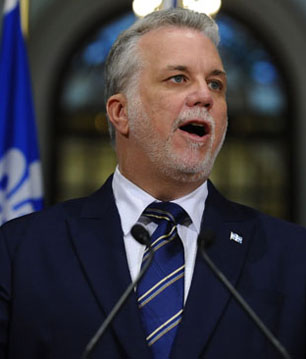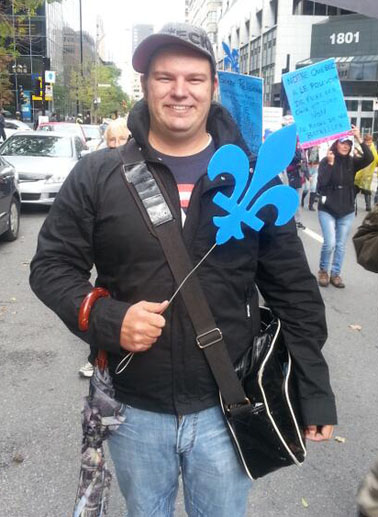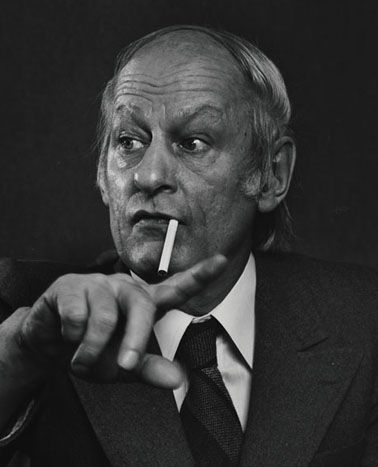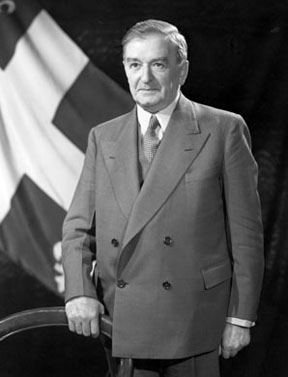Is PQ turning into just another Saskatchewan Party .. clearly not .. Quebec not like others .. but .. ??
Oct 9th, 2016 | By Citizen X | Category: Canadian Provinces
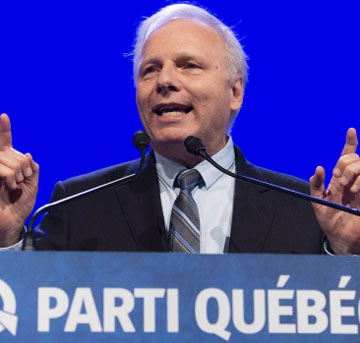
Jean-François Lisée has become ninth leader of the Parti Québécois, replacing Pierre Karl Péladeau, who quit politics this past May. (Jacques Boissinot/The Canadian Press.)
What a relief to escape, even for just one moment, from the latest crazy Trumpet playing of the “Yankee to the south of us” who “must south of us remain” – and into something allegedly more sensible, like the future of the Parti Québécois in Canada.
The occasion is the election of Jean-François Lisée as new PQ leader, by about 55,000 participating party members – voting “online and by phone using a preferential ballot” from this past Wednesday, October 5 to Friday, October 7.
M. Lisée received the required majority of the vote in a second round of balloting (50.63% to be exact), with results coming in “just after 9:40 p.m” Friday night.
The media have pointed to two main ingredients in Lisée’s victory. The first recalls unsettling answers also blowing in the wind in the USA, UK, the EU the UK is apparently leaving, and still other places no doubt (Japan, even in some ways Hindu India, and perhaps China too?).
As explained in a CBC News report on the PQ leadership vote by Kalina Laframboise : “Recent polls suggested that Lisée gained support among the party’s rank and file after he focused on identity politics, including a proposal to welcome fewer immigrants to Quebec and a vow to ban the burka in public spaces.”
The Canadian Press report published by the Toronto Star pointed to a second main ingredient in Lisée’s victory : “His strategy of not supporting a [Quebec sovereignty] referendum in a first PQ mandate paid off at a time when polls consistently suggest Quebecers do not want another plebiscite on the province’s political future.”
Just what might the Parti Québécois become?
Kevin Dougherty has summarized the latest polling evidence here in an ipolitics piece called “Is separatism over?”
He notes : “In a recent Angus Reid/CBC poll … 82 per cent of all Quebecers surveyed agreed … ‘Ultimately, Quebec should stay in Canada.’ … Among French-speaking Quebecers surveyed, 73 per cent shared the view … with 64 per cent … Â agreeing the ‘issue of Quebec sovereignty is settled, and Quebec will remain in Canada.’”
The Canadian Press report also noted that “Lisée, as with all PQ leaders, had no choice but to tell party members sovereignty is still front and centre in his mind.” And who knows? If Lisée’s PQ did win the next Quebec election in 2018, his current commitment could just mean that la belle province would have a third sovereignty referendum as early as 2022.
On the other hand, as, if, and when Jean-François Lisée shrewdly concludes that an independent Quebec could never get as good a deal from the rest of Canada as the Québécois nation in a united Canada is getting right now, rather different prospects may lie ahead.
Even if  the “issue of Quebec sovereignty is settled, and Quebec will remain in Canada,” that is to say, the Parti Québécois will also celebrate its 50th anniversary in 2018.
Even with Coalition Avenir Québec and Québec solidaire, the PQ is likely enough not going to go away, until long after the dream of an independent francophone state in North America has practically vanished.
That raises the question of just what the Parti Québécois might become?
And, while casting about for hints, the Saskatchewan Party that will celebrate its 21st anniversary in 2018 may be worth just a few minutes’ reflection.
Not really like the Saskatchewan Party … but …
It is certainly true that in many important respects the Parti Québécois is nothing at all like the Saskatchewan Party, despite the parallel nomenclature. To start with, even though all Canadian provinces are “sovereign” with respect to their powers under the Constitution Act, 1867, Quebec has never been “a province like the others.”
Most poignantly, the democratic majority in Quebec speaks French. In all other provinces (even New Brunswick) the majority speaks English. And then “Quebec is the only province in Canada … under which civil matters are regulated by French-heritage civil law,” as opposed to English common law.
(And then late in November 2006 “the Canadian House of Commons voted 265-16 in favour of the resolution ‘That this House recognizes that the Québécois are a nation within a united Canada.’”)
At the same time, according to the same recent Angus Reid/CBC poll reported on by Kevin Dougherty above, 59% of those surveyed in Quebec believe “my province is treated fairly by the national government” – Â compared with only 49% in Atlantic Canada, 40% in Saskatchewan, and 36% in Alberta.
Similarly, the Saskatchewan Party is resolutely right-wing and chiefly a refuge for members and supporters of the old provincial Progressive Conservatives. The Parti Qu̩b̩cois founded by Ren̩ L̩vesque in 1968 was more clearly a left-wing social democratic party Рand still retains many marks of these origins.
At the same time again, Quebec nationalism has always had a conservative, right-wing side, as well as a social democratic left-wing side. The present Quebec flag was the invention of Maurice Duplessis’s right-wing Union Nationale government of Quebec in 1948.
Already, some might say, Jean-François Lisée’s PQ is showing signs of movement towards the kind of right-wing populism currently on at least a modest rise (and possibly worse) in contemporary Europe. (As Liberal Premier Philippe Couillard has already pointed out, with perhaps a little more vigorous concern than the case really warrants? Still … )
Blowing in the wind?
Some kind of change from the political cliches of the past half century is apparently blowing in the Quebec wind nowadays, and in other parts of the country too.
That has to qualify as a very good thing. And if the Parti Québécois does evolve even just a very little in the direction of the Saskatchewan Party over the next several years, or more, that might at least prompt the Saskatchewan Party (and its current leader) to acknowledge just how much it has been and continues to be influenced and inspired by the example of the Parti Québécois!
